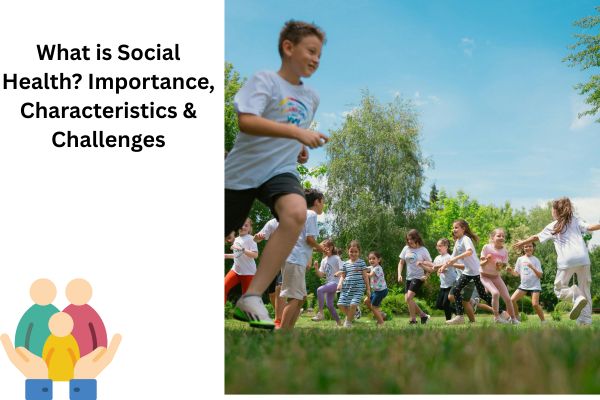Have you ever felt lonely in a crowd or noticed how one genuine conversation can brighten your entire day? Surprisingly, these small moments don’t just affect your mood—they quietly shape your overall well-being in ways most people never realize.
But what if there was a hidden part of your life, influencing your happiness, your stress, and even your energy, without you even noticing? It exists, and it might just be the missing link to living a fuller, more balanced life.
Defining Social Health
Social health refers to the capacity to form positive relationships, interact with others harmoniously, and feel a sense of belonging in your community. Think of it as the invisible thread that ties your emotional well-being, mental balance, and even physical health together.
A socially healthy person can:
- Express themselves clearly and respectfully
- Maintain balanced relationships without unnecessary conflict
- Offer and receive support during challenging times
- Adapt to different social situations with empathy and understanding
Characteristics of Social Health
The three characteristics of social health often include connection, communication, and contribution, but we can also explore related traits like empathy, adaptability, and trustworthiness that play a key role in nurturing strong social bonds.
1. Connection: Building a Sense of Belonging
Connection is the foundation of social health. It’s not just knowing people—it’s feeling accepted, supported, and part of a community.
Key Points:
- Emotional support reduces stress and anxiety.
- Shared experiences create lasting bonds.
- Strong social networks improve overall happiness and resilience.
Example: Regular family dinners, joining a local hobby group, or attending social events build deeper connections that enhance your sense of belonging.
2. Communication: The Art of Understanding
Communication is not just about speaking; it’s about listening, understanding, and expressing yourself clearly.
Key Points:
- Active listening shows respect and builds trust.
- Clear expression prevents misunderstandings.
- Non-verbal communication (body language, tone) conveys emotions effectively.
Example: Having open conversations with a friend about challenges can strengthen trust and deepen your bond.
3. Contribution: Giving and Receiving Support
Contribution means offering help, support, and kindness to your social circle or community. It fosters positive thinking techniques and positive relationships and personal fulfillment.
Key Points:
- Acts of kindness strengthen relationships.
- Volunteering enhances self-worth and social recognition.
- Mutual support encourages trust and cooperation.
Example: Mentoring a colleague, volunteering locally, or helping a neighbor demonstrates social responsibility and nurtures community.
4. Empathy: Understanding Others’ Feelings
Empathy is the ability to put yourself in someone else’s shoes. It’s critical for maintaining strong social bonds and resolving conflicts.
Key Points:
- Builds trust and emotional safety.
- Reduces misunderstandings and tension.
- Encourages supportive interactions.
Example: Listening without judgment when a friend shares a problem shows empathy and strengthens your relationship.
5. Adaptability: Navigating Social Situations
Being socially healthy also means adapting to different personalities and situations. Flexibility helps you maintain harmony in diverse social environments.
Key Points:
- Helps handle conflicts gracefully.
- Supports collaboration in group settings.
- Enhances your ability to connect with varied social circles.
Example: Adjusting your communication style depending on whether you’re with colleagues, family, or strangers improves social interactions.
6. Trustworthiness: Building Strong Foundations
Trust is the glue of social health. Being reliable, honest, and consistent strengthens your relationships and encourages openness.
Key Points:
- Encourages long-term relationships.
- Promotes mutual respect.
- Creates a safe space for sharing and support.
Example: Keeping promises, being honest in conversations, and respecting confidences make you a socially healthy individual.
Signs / Traits of a Socially Healthy Person
A socially healthy person maintains meaningful relationships, communicates with empathy and respect, and balances social time with personal space. They handle conflicts maturely, offer support, and feel comfortable receiving help when needed.
- You enjoy spending time with others but also value alone time.
- You can handle disagreements maturely.
- You have at least a few close people you trust deeply.
- You offer help and feel comfortable asking for it when needed.
- You communicate with empathy and respect.
Importance of Social health
Social health plays a vital role in our overall well-being. It influences not only how we interact with others but also our mental, emotional, and physical health.
1. Enhances Mental and Emotional Well-Being
A strong social network boosts your mood and helps manage stress effectively. People with good social health tend to feel happier and more fulfilled.
- Reduces feelings of loneliness and isolation
- Provides emotional support during challenging times
- Encourages a positive outlook and resilience
- Helps prevent anxiety and depression
- Fosters a sense of belonging and purpose
2. Improves Physical Health
While poor physical health can impact your social health, being socially healthy often contributes to better overall physical well-being. Positive relationships can influence lifestyle choices and even impact longevity.
- Strengthens the immune system through reduced stress
- Encourages healthier habits like exercise and balanced diet
- Supports quicker recovery from illness or surgery
- Lowers the risk of chronic conditions linked to stress
- Promotes overall energy and vitality
3. Builds Stronger Relationships
Being socially healthy helps you connect meaningfully with others. These connections enrich your personal and professional life.
- Encourages trust, understanding, and cooperation
- Enhances communication and conflict resolution skills
- Creates a reliable support system for tough times
- Strengthens family, friendships, and workplace bonds
- Fosters mutual respect and empathy
4. Supports Personal Growth and Confidence
Social health contributes to your self-esteem and ability to navigate life challenges. Healthy relationships encourage you to grow and become more resilient.
- Provides constructive feedback and guidance
- Helps develop interpersonal and problem-solving skills
- Boosts self-confidence through social affirmation
- Encourages learning from diverse perspectives
- Inspires motivation and goal-setting
5. Influences Social Determinants of Health
Your social health is connected to broader social determinants of health like community, education, and socioeconomic factors. A supportive environment can improve overall well-being.
- Access to community resources and social programs
- Safe and supportive neighborhood interactions
- Opportunities for education and personal development
- Exposure to positive role models and mentors
- Strengthened civic engagement and community contribution
How to Improve Social Health?
You can always improve your social well-being, no matter your personality type. It’s about small, intentional steps that strengthen relationships and create a sense of connection. Here are practical ways to get started:
1. Reach Out
Reconnecting with friends or family you’ve lost touch with can reignite meaningful relationships. Even a simple text, phone call, or coffee meet-up can rebuild bonds and remind both of you of your shared support and memories.
2. Join a Group
Participating in clubs, classes, or volunteering projects introduces you to like-minded people and broadens your social network. Shared interests create natural opportunities to connect, collaborate, and form lasting friendships.
3. Listen Actively
Active listening is more than hearing words, it’s about showing genuine interest and understanding. By focusing on what others are saying, asking thoughtful questions, and responding empathetically, you strengthen trust and deepen your relationships.
4. Set Healthy Boundaries
Being socially healthy also means knowing when to say “no.” Setting boundaries protects your energy, prevents burnout, and ensures that your relationships remain balanced and respectful.
5. Practice Empathy
Empathy allows you to see the world from someone else’s perspective. Understanding others’ feelings and challenges nurtures compassion, reduces conflict, and builds stronger emotional connections.
6. Limit Digital Distractions
Spending too much time on phones or social media can weaken real-world relationships. Prioritize face-to-face conversations, quality time with friends, and meaningful interactions to strengthen your social bonds.
Challenges & Obstacles in Building Social Health
Improving social health isn’t always straightforward. Life throws various challenges our way that can impact both our social and mental health, making it difficult to form and maintain meaningful connections. Understanding these obstacles is the first step to overcoming them.
1. Social Anxiety or Shyness
Fear of judgment, rejection, or awkward interactions can hold you back from reaching out to others. Socially healthy people learn to acknowledge these feelings without letting them control their actions.
Tip: Start with small, low-pressure interactions, like greeting a neighbor or commenting in a group discussion. Gradually, confidence will grow.
2. Busy Lifestyles
With work, family responsibilities, and personal commitments, finding time for meaningful conversations can be tough. Constant busyness often leads to neglected relationships.
Tip: Schedule short but intentional interactions, a 10-minute call or a quick coffee break can maintain bonds and show people you care.
3. Digital Isolation
Being “connected” online doesn’t always translate to real-world social connection. Excessive time on phones or social media can lead to feelings of loneliness or disconnection.
Tip: Prioritize in-person interactions when possible, or set aside dedicated time to engage meaningfully with close friends and family instead of scrolling aimlessly.
4. Cultural or Communication Differences
Differences in culture, language, or communication styles can create misunderstandings and distance. Without awareness, these gaps may weaken relationships over time.
Tip: Practice patience, active listening, and curiosity. Asking questions and showing genuine interest can bridge cultural or communication barriers effectively.
Conclusion
Social health is about more than just having friends, it’s about building meaningful connections, communicating effectively, and feeling a sense of belonging. Understanding social health and its key characteristics helps you improve your relationships, emotional well-being, and overall life satisfaction.
Even with challenges like social anxiety, busy schedules, or digital distractions, small steps like reaching out, practicing empathy, or setting healthy boundaries can make a big difference. Investing in your social health leads to stronger connections, greater confidence, and a happier, more balanced life.
Frequently Asked Questions
Social health is the ability to form positive relationships, communicate effectively, and feel a sense of belonging. It’s important because it impacts your mental, emotional, and physical well-being, helping you live a happier, more balanced life.
The three main characteristics of social health are connection, communication, and contribution. Connection ensures a sense of belonging, communication strengthens understanding, and contribution builds trust and mutual support.
You can improve social health by reaching out to friends and family, joining communities or groups, practicing active listening, setting healthy boundaries, showing empathy, and limiting digital distractions.
Social determinants of health include factors like community support, education, income, and access to resources. They influence your ability to maintain strong social connections and overall social well-being.
Being socially healthy means having meaningful relationships, communicating with empathy and respect, handling conflicts maturely, offering and receiving support, and balancing social time with personal space.



